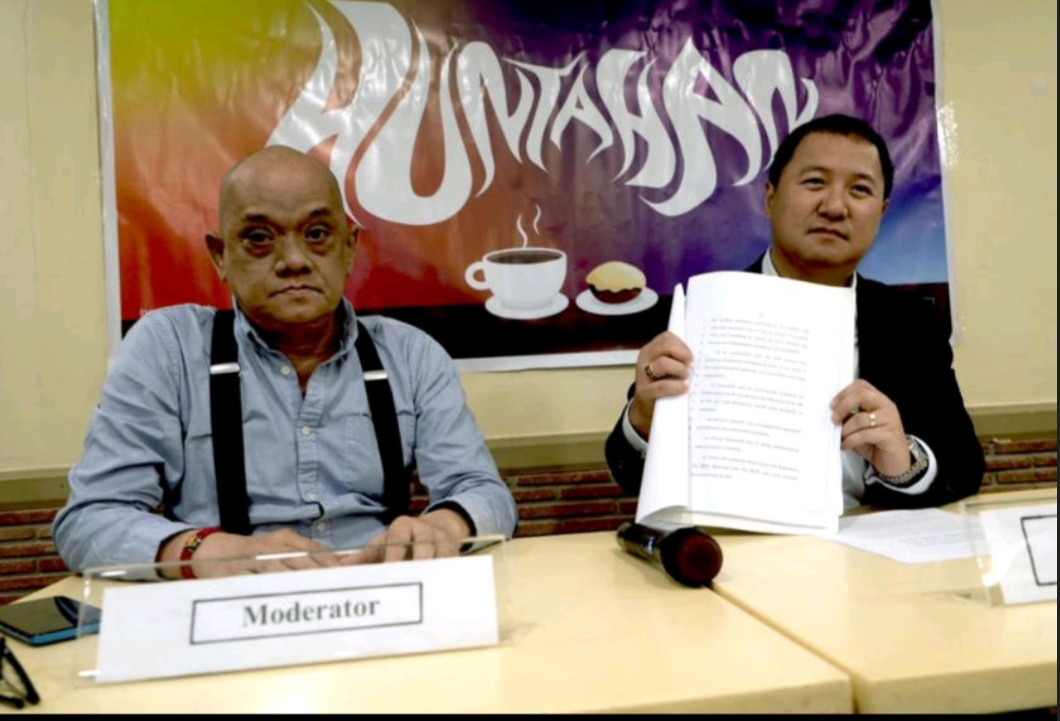By Perfecto T. Raymundo, Jr.
QUEZON CITY — Former DICT (Department of Information and Communications Technology) Undersecretary for Cybersecurity Jeffrey Ian Dy on Wednesday (Aug. 6) said that Konektadong Pinoy Bill has passed in the Bicameral Conference Committee (Bicam).
In the Huntahan Media Forum at Aristocrat Restaurant, QC Circle hosted by Toto Ylagan, the former DICT Undersecretary showed to the members of the media a copy of the Konektadong Pinoy Bill that has passed the BiCam.
Ylagan cited Senate Bill 2699, otherwise known as the “Konektadong Pinoy Act”.Dy is now teaching in the Asian Institute of Management (AIM) in Masters of Cybersecurity.
Dy said that the Konektaong Pinoy Bill has just passed the BiCam last July. The President has 30 days within which to act on the law, otherwise, he may not act on it or it may lapse into law.
“We’re telling him not to make mistake on it,” Dy said. When he was DICT Undersecretary, Dy wanted to share the antenna towers, telecommunications infrastructure, or they may be charged in court.
Their appreciation of cybersecurity in Section 9 of the Konektadong Pinoy Bill was not strict. Three years reprieve for cybersecurity certification.
“You are forcing the DICT to share the infrastructure,” Dy said.
A Chinese company in Northern Luzon could not share because it has no bandwidth.
“I would not want to reiterate how important Northern Luzon is as it is in the West Philippine Sea,” Dy said.
The United States has a policy to disallow all the telecommunications to connect directly to China, but the Philippines does not have such a policy.
“If the President vetoes the Konektadong Pinoy Bill, he would actually allow the interconnection of the telecommunications companies,” Dy said.
“They actually forgot the actual entire dynamics of the market of the telecommunications companies, which may compromise national security,” he added.
“The objective of the telecommunications is to share. ‘To lease’ was blocked in the Konektadong Pinoy Bill,” Dy said.
The data transmission has rental fee. “The Bill is trying to promote sharing, but it attacks the sharing of infrastructure of telecommunications companies,” Dy said.
The Konektadong Pinoy Bill is trying to force the telecommunications companies to share their infrastructure, which can be questioned locally, but not with the rental.
“It takes billions of dollars to bring them (telecoms) here in the Philippines,” Dy said.
“We don’t agree with signing first with the Konektadong Pinoy Bill,” he said.
“Before it lapses into law, the President should veto it,” he added.
Dy cited for an example the Northern Luzon area, where some local government units are contracting a Chinese telecommunications company, which has already established an active 15,000 kilometers of fiber as of December 2024, but it’s not connected to the national backbone.
The Konektadong Pinoy Bill regulates the fixed data, but it jeopardizes satellite data.
“I would suggest that you provide incentives for telecommunications companies to share their infrastructures. The Bill does not force the mall owners or operators to share their telecoms infrastructure, but only the telecommunication companies themselves,” Dy said.
He also cited that if they made the controversial “Hello Garci”, they can do it to “Tom, Dick and Harry”.
Dy stressed that Sections 16 and 22 of the Konektadong Pinoy Bill forces the telecommunications companies to interconnect or share their infrastructure. “It may affect our international relations,” he said.
“The word ‘non-discriminatory’ was used several times in the entire Konektadong Pinoy Bill,” Dy said.
In the event that the Konektadong Pinoy Bill is signed into law by President Marcos, former Supreme Court Chief Justice Artemio V. Panganiban may file a petition before the Supreme Court questioning its constitutionality.
“U335 is attacking the routers, which the United States suspects is coming from China,” Dy said. ###







